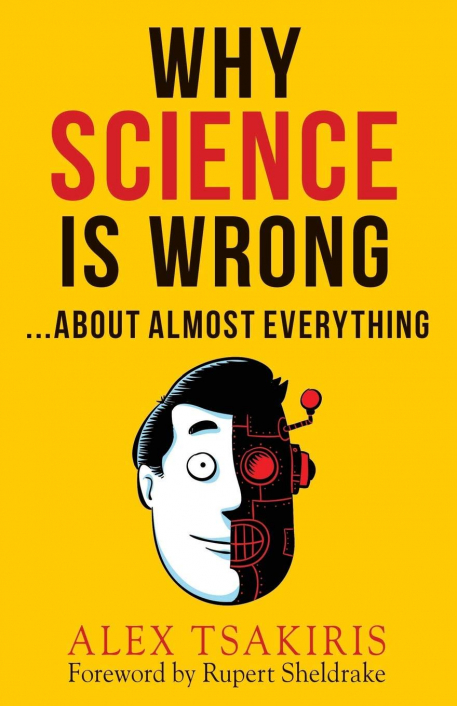
Even the endorsement by Dean Radin, who would agree with much of what Tsakiris says and who is treated positively in the book, begins: ‘There’s nothing wrong with science itself.’ The problem, as Radin continues, is with scientists who misrepresent the evidence. Tsakiris, presumably for marketing purposes, preferred his original title, but his provocative strategy may backfire. While he will get a number to pick up the book because they are intrigued by its title, he is as likely to deter others who might agree with some of his sentiments but who feel that such a title is merely a stick that opponents can use to beat them with as scientific illiterates, or that someone who takes such an extreme stance is going to be an unreliable commentator.
Tsakiris is of course no stranger to controversy. His Skeptiko podcast has carried interviews with researchers and thinkers of diverse persuasions. He began in 2007 and at the time of writing this his show has clocked up over 260 interviews. Why Science is Wrong contains extracts from a selection of these, a tiny fraction of the total, grouped thematically, and they demonstrate the strengths and weaknesses of his agenda.
Science, according to the chapter titles, is wrong about all sorts of things. It is wrong about … consciousness, quantum physics (five pages that barely touch on the topic), near-death experiences, psychics and mediums, telepathy (including the canine variety), psychic detectives, healing and medicine, atheism, Darwin and evolution, even science itself. Tsakiris admits he is not a scientist and his persona is that of a keenly interested fast-learning autodidact able to talk with ease on the same level as experts who may have spent decades studying a subject (though he has an MBA, so he is no slouch intellectually).
He has a robust – putting it mildly – interviewing style. At his best, with a subject he knows a lot about (notably NDEs) and with a sympathetic interviewee, his conversations can be illuminating. Conversely he can pick out the weaknesses of his interviewees’ arguments in a way that is merciless. He is adept at showing how little sceptics (or rather pseudo-sceptics) have often thought about the ramifications of the subject they are on to talk about. In that sense Tsakiris provides a useful service in showing that simply because someone expresses a view strongly, it does not necessarily mean it is based on deep research. On the other hand he has a tendency to take an inability to provide a counter-argument as evidence for his own position, and he is not even-handed when debating those whose ideas he finds uncongenial.
The book is billed as ‘A rollcking assault on science’s inability to answer life’s most important questions’. I’m not sure it counts as rollicking, but an assault it certainly is. The section on consciousness attacks the premise that consciousness is solely a product of the brain. It seems that the reason why Tsakiris chose his title, and spends so much time discussing consciousness, is because he views it as the key area where science has failed, and catastrophically so: ‘If my consciousness is something – anything – other than a product of my brain’ (and he is convinced it isn’t a product of his brain) ‘then science is out of business until it figure out exactly how my consciousness interacts with this world.’ Without an understanding of how consciousness fits into the picture, he argues, science can never give a complete picture of any subject to which it is applied.
Instead, to cover up its deficiencies, we get what he calls the ‘Dopey Science Creed’ characterising mainstream science which makes bold claims that there is no purpose to anything, free will is an illusion, we are nothing more than our physical brains and the death of the brain means the death of the person, the paranormal is bunk, and so on. By contrast, Tsakiris has concluded from his interviews that the evidence strongly supports the contention that consciousness is not constrained by the brain, we survive death, and our existence has meaning.
In fleshing out this thesis the book’s first half is by far the strongest, but it feels weaker as it proceeds. The chapters on consciousness, NDEs, mediumship, telepathy and healing go into as much detail as space will allow, and while the reader may not shift from a sceptical position as a result, the interviews are stimulating and challenging. That on psychic detection descends into a ‘he said she said’ which shows the lengths critics will go to in splitting hairs to try to prove a point, but doesn’t go beyond hearsay in discussing the reality of psychic detection.
The chapter on atheism is confusing and unconvincing as Tsakiris has an image of atheists that they uniformly believe life to be ‘a meaningless illusion created by biologic (sic) robots.’ While there may be those who think it, though I’ve not met one, or at least one willing to admit to such a bizarre belief, it is a crude generalisation to lump all atheists in that category. Such a broad claim should be backed by evidence, but there is none here.
The interviews on evolution and Charles Darwin are mostly about charges that Darwin plagiarised Alfred Russel Wallace, the true ‘discover’ of evolution, with no dissenting opinions. Tsakiris considers evolution a ‘reasonable approximation of how living organisms change’, but seems to feel that the problem with Darwinism is that it promotes a ‘survival of the fittest’ mentality inimical to broader spiritual values. This may be deemed a curious attitude from someone who has an MBA and describes himself as ‘a successful entrepreneur’, but one can see why he might be unhappy with a lack of meaning within Darwinian evolution. Although Tsakiris does not mention Russell’s interest in Spiritualism, he considers Russell’s brand of evolutionary theory to be superior because it ‘isn’t about survival of the individual, but survival of the group.’ Presumably that involves the notion of existence containing meaning so lamentably absent in Darwinism; it’s really hard to tell.
Tsakiris’s introduction is, as is his website, subtitled ‘Science at the tipping point’, the tipping point being science’s move away from crass materialism to give the role of consciousness its due. He comes back to this issue towards the end when he characterises science as it is currently conceptualised as the ‘Emperor’s New Clothes’ and argues that we need to move beyond the restrictive approach which says, in his words, that ‘we’re just an illusion created by this meaningless electrochemical reaction going on inside our brain.’
On the contrary, Tsakiris vehemently protests that we are not ‘meaningless’, while acknowledging that he does not know what that meaning is. But it’s really not clear to me on what basis he concludes that there is meaning to existence, other than wishful thinking. As a consequence it’s an interesting yet ultimately unsatisfying book, too short and bitty to do justice to the richness of the Skeptiko archive, too often concerned with point-scoring, and not pulling the interview extracts into a coherent narrative. Instead he jumps around, with a tendency to stray from the subject of a particular chapter.
Even so, the book should provide a service in directing readers to his website so that they can listen to the podcast interviews themselves. Used with care they are a valuable resource, with some fine researchers given space to expound, but the listener needs to be aware that Tsakiris has an agenda, and make allowances accordingly.
Now that he has a higher profile, it is possible that people not in tune with his views will be increasingly reluctant to appear on his show, so the range of interviewees may decrease in future. Those who are invited on and are fooled by the ‘Skeptiko’ tag into thinking that they are dealing with a host who is in sympathy with the aims of the Committee for Skeptical Inquiry, and who fail to do due diligence on what they could be getting themselves into, will only have themselves to blame for a bruising encounter.
Is the term ‘Skeptiko’ misleading? Yes, in a way, but only because ‘scepticism’ has been co-opted by an approach that Tsakiris would claim isn’t sceptical at all, because it represents a narrow materialist status quo. He sees himself as truly an iconoclastic sceptic because he takes on those vested interests, but he has a problem distinguishing the baby from its bathwater.
NB Alex Tsakiris has posted a response on the Skeptiko website:

